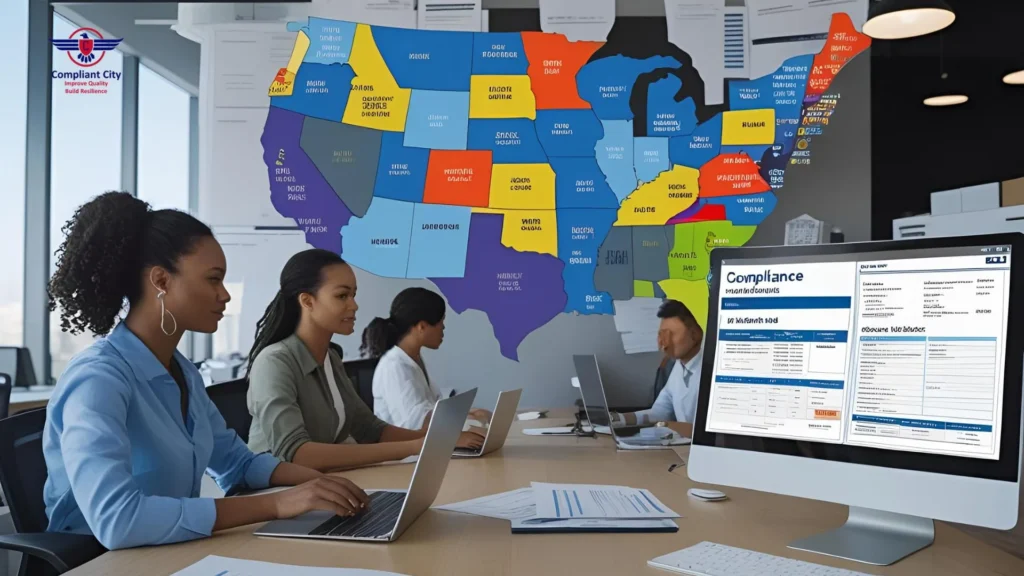📌 Introduction
Less than two years later, in July 2025, the U.S. Equal Employment Opportunity Commission (EEOC) initiated a large lawsuit against 1st Franklin Financial Corporation, charging the company with disability discrimination and failing to provide disability accommodations to workers with such conditions. The case serves as a stark reminder that ADA compliance is not an optional, it is a legal and moral requirement. Not investing in the compliance of ADA can result in lawsuits, negative brand association, and distrust of employees.
The legal landscape is winding and complicated, and, at Compliant City, we kind of make it our job to help HR and payroll professionals with it by providing expert-led webinars, trainings, and compliance resources. In this piece, we’ll cover what happened, why it matters, and steps employers can take proactively to steer clear of similar legal quagmires.
🧾 The Case: EEOC v. 1st Franklin Financial
According to the EEOC’s suit, 1st Franklin has since 2022:
- Refused to provide reasonable accommodation to employees with disabilities
- I’ve hade no other accommodations suggested when talking about the issue
- The closedown of employees who were physically unable to work for medical reasons at a surgical stall
One particularly notable one was a customer service rep who had had multiple heart attacks and had to be hospitalized. He asked for a brief furlough, with the anticipation that he would be discharged from the hospital shortly. The company refused the leave and fired him.
The EEOC asserts that such conduct violates the Americans with Disabilities Act (ADA), which prohibits discrimination against employees and protects their right to reasonable accommodations.
⚖️ ADA Compliance: What the Law Requires
The ADA requires employers with at least 15 employees to offer reasonable accommodations to workers with disabilities — as long as doing so does not create an undue hardship for the business.
Common Reasonable Accommodations Include:
- Work shifts or hours changed or decreased
- Furloughs or medical leave (whether paid or unpaid)
- Adjusted job duties or workspace
- Work-from-home arrangements where feasible
Moreover, employers need to interactive with the employee to discuss alternative options. Actually, a flat out refusal with no discussion may be a violation.
❌ Errors That Could Result in Lawsuits
The 1st Franklin case illustrates a few of the mistakes employers often commit:
Rigid Policy Adherence
There is a risk of noncompliance when trying to deny accommodation requests using an internal leave policy or “one size fits all” rules. Law overrides company policy.
Failing to Engage in Dialogue
When an employee asks for an accommodation, employers must participate in an interactive dialogue in good faith. A red flag would be for him to ignore or sidestep this conversation.
Immediate Termination Without Alternatives
Terminating an employee based on a temporary disability or hospital stay, without considering other factors, could be viewed as disability discrimination.
Not Documenting Decisions
Not documenting requests, decision-making processes, or other possible accommodations may be detrimental to your case in court or in an audit.
✅ What Employers Need to Do Now to Ensure ADA Compliance
Being proactive about your ADA compliance protects you from lawsuits, increases employee satisfaction, and makes the workplace a more trustworthy place. Preventing ADA-related lawsuits begins with intelligent, proactive HR practices. Here’s what every HR department or small business owner needs to do right now:
✔️ 1. Look at Your Leave and Accommodation Policies
Revise your employee manual to conform with ADA requirements. Policies should mention:
- The availability of accommodations
- The process for requesting them
- Your obligations as an employer
✔️ 2. Train Managers and HR Staff
Regular education helps organizations avoid errors and achieve greater ADA compliance at all organizational levels. The vast majority of ADA missteps occur at the supervisor or middle-management level. Regular training ensures your team:
- Understands ADA requirements
- Knows how to make permissions suggestion solves.
- Properly documents all actions taken
✔️ 3. Implement a Clear Request Process
Design an employee friendly and transparent process for requesting accommodations. Include:
- A standard form
- Contact information for HR
- Walk through requests explanation
It’s crucial to have clear documentation and processes in place, which can help you to show your ADA compliance during audits or EEOC inquiries.
✔️ 4. Document Everything
Record every conversation and rationale from the first request to the last decision. This protects you from a legal standpoint and keeps you consistent.
✔️ 5. Evaluate “Undue Hardship” Honestly
Undue hardship doesn’t mean “inconvenient.” If you refuse a request, do you need to prove that the request would be unusually burdensome or costly?
🧠 Real-World Tip: Medical Leave ≠ FMLA Only
If the employer has 50 or more employees within a 75-mile radius and the employee has worked at least 1,250 hours in the previous 12 months, it must designate the leave as FMLA.
Misconception No. 5: If an employee is not covered by the Family and Medical Leave Act (FMLA), we do not have to offer leave
Some employers mistakenly think that if an employee does not qualify to take leave under the FMLA, they are not required to offer the employee leave. This is incorrect.
The ADA says you may have to provide unpaid leave as a reasonable accommodation—even if FMLA eligibility thresholds aren’t met or the employee isn’t even eligible. ADA protections may still apply even when FMLA protections do not, particularly at small- to mid-size organizations.
📋 BONUS: Employer’s Checklist for ADA (Accommodations and more)
Here’s a short compliance checklist you can use to better protect your organization:
- ✅ Explicit policy for giving students with disabilities accommodations
- ✅ Interactive process steps documented
- ✅ Managers Educated About ADA Duties
- ✅ Review and analysis of job descriptions of essential functions
- ✅ Track Requests and Decisions
- ✅ Regular review of housing practices
- ✅ Review by external legal or ADA compliance consultant (as applicable)
- ✅ Perform internal audits of ADA compliance at least annually
- ✅ Stay informed of any federal and state changes that will impact ADA compliance policies
Is this checklist available as a downloadable PDF? Click here to request it.
🎯 How Compliant City Can Assist
At Compliant City, we’re dedicated to helping HR and payroll practitioners get ahead of compliance problems. Our attorney-led webinars and resources discuss ADA demands, EEOC case reviews, employee handbook updates, and so much more.
📝 Final Thoughts
The EEOC’s most recent lawsuit serves as an early warning to all employers. The expense of not complying extends well beyond financial penalties—impacting company morale, reputation and future hiring.
Begin with your policies, train your managers, and work with a proven compliance education provider, such as Compliant City. We’re here to help you stay informed, navigate the new requirements and be confident in 2025 and beyond.
Compliance with Section 508 should be about more than a one-time investment; it needs to be a constant effort, particularly as regulations change and EEOC enforcement grows.
Ready to take action?
Allow Compliant City to be your trusted ally in controlling risk and enhancing the way you approach ADA compliance in every area. Learn more about ADA compliance and register for our next webinars at www. CompliantCity. com




